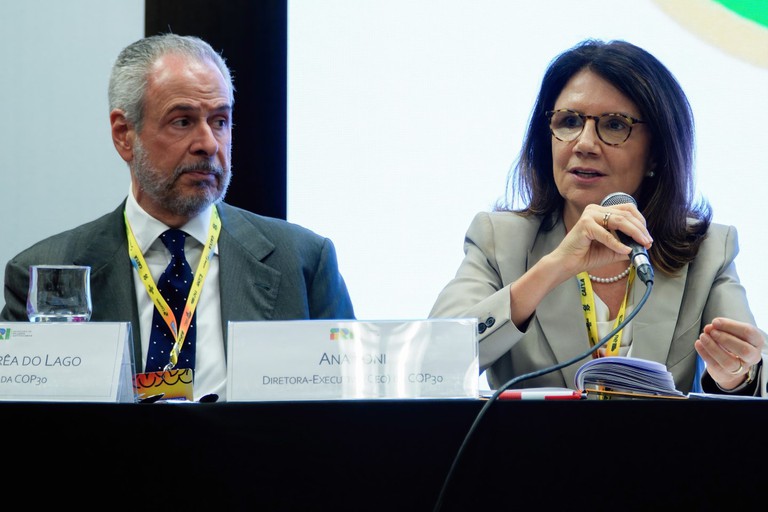Mayors play a key role in addressing climate change, highlights COP30 president
Mayors play a key role in addressing climate change, highlights COP30 president
By Leandro Molina | leandro.molina@presidencia.gov.br

The president of COP30, André Corrêa do Lago, attended a meeting of new mayors held in Brasilia this week. In one of the panels of the event organized by the Federal Government, the Ambassador spoke about the importance of aligning municipalities with climate change mitigation goals. The event brought together municipal leaders from across the country to address the central role of cities in implementing climate policies and promoting local actions to reduce greenhouse gas emissions.
André Corrêa do Lago emphasized the importance of integrating cities into global climate discussions, especially in light of the challenging scenario presented by science. "Cities are excited. This proves how important it is to increasingly integrate cities into the COPs," stated the ambassador.
He highlighted that Brasil is a highly urbanized country, with 87% of the population living in cities, and that even in Amazônia more than 70% of the population resides in urban areas. "The solutions from cities will be the ones that will most quickly bring climate change mitigation closer to the people," he said.
The ambassador also emphasized the need to share with the public the good news and existing solutions for addressing climate change. "Fighting climate change can be very positive for economic growth, and people's lives should improve as a result," he stated. He also underscored the role of COP30, to be held in Belém in November, as an opportunity to strengthen the idea that Brasil is one of the countries that can benefit the most from the climate agenda.
Cities on the front lines of climate change consequences

Also in attendance, the executive director of COP30, Ana Toni, emphasized the importance of bringing the climate debate to the center of municipal discussions. "The consequences of climate change knock on the doors of cities. When there are floods, fires, or water shortages, it is at the doors of mayors that the population knocks," she affirmed. She pointed out that although the climate debate began at the global level, solutions need to be implemented locally, with the collaboration of federal, state, and municipal governments.
Ana Toni mentioned the four pillars of COP30: the leaders' meeting, negotiations, the action agenda, and mobilization. "COP30 in Brasil will be a milestone to accelerate projects and solutions, and cities will be on the front lines," she declared. She also emphasized the importance of financing for climate actions, citing programs such as the Climate Fund and EcoInvest, as well as the crucial role of national and international banks.
Climate solutions must be holistic
Anaclaudia Rossbach, executive director of UN-Habitat, stressed the importance of cities as centers for solutions to climate crises. “More than half of the world's population lives in cities, and by 2050 it will be 70%. Cities are where the people are, and it is there that solutions must be implemented,” she said. The director pointed out that cities suffer disproportionately from the impacts of climate change, particularly the most vulnerable populations, such as those living in slums and precarious settlements.
She also emphasized the need for holistic solutions that integrate environmental, social, and economic issues. "We cannot address the environmental issue without tackling inequalities. Cities have the ability to coordinate actions on the ground and provide integrated responses," she pointed out. She also highlighted the importance of urban planning and sustainable land use to ensure that cities are resilient and prepared for climate challenges.
The 21st century will be the century of cities
Edvaldo Nogueira, former mayor of Aracaju and president of Brazil’s National Front of Mayors (Frente Nacional de Prefeitos /FNP), advocated for municipalism as a key element for development and the resolution of 21st-century problems. "Cities will be decisive in facing the challenges of climate change. There is no solution without the active participation of cities," he stated. He emphasized that cities are responsible for a large portion of global emissions and, at the same time, are the most affected by the impacts of climate change.
Nogueira also highlighted the opportunity for Brasil to lead by example at COP30. “Brasil can set a great example to the world, just as it has done in other areas. Now we have the chance to show our leadership in tackling climate change,” he assessed.
Cities lead the climate agenda
Gregor Robertson, ambassador of CHAMP (Coalition of Climate Leadership), highlighted the role of cities as leaders in the climate agenda. "Cities are ahead of their countries, going further and faster in climate solutions," he stated. He mentioned that 75% of cities committed to the climate agenda are delivering commitments greater than those outlined in their Nationally Determined Contributions (NDCs), which correspond to each country's climate action plans.
Robertson praised Brasil's leadership in the climate agenda and highlighted the importance of COP30 as an opportunity to scale up funding and projects. "COP30 will be a milestone to show the world Brasil's leadership and the power of multilevel partnerships," he emphasized. He added that without the participation of cities, it will not be possible to win the battle against climate change.
Other panelists also reiterated that the collaboration of municipal governments will be essential to ensure that goals are met and that the impacts of climate change are minimized.
